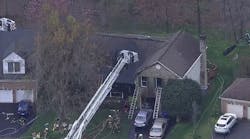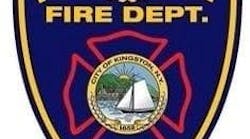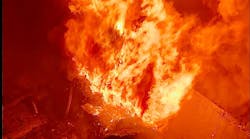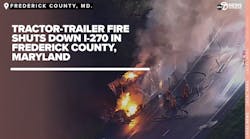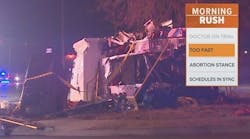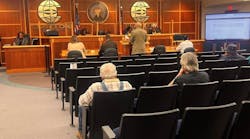The people you work with deserve your best.
Fire officers are given a specific job. They must lead the companies they work with and are responsible for making decisions regarding the safety of the team. The decisions they make are the reason the positions exist.
Many decisions are made under times of great stress. Lives may be at stake. The choices they make can and will impact the lives of several people. Deciding to go for a rescue, writing off a building and staying defensive and holding fast to the "two in/two out" rule are some of the fireground decisions we get paid extra to make.
Some of these decisions will be wrong. We are human. Not having all the facts and placing a time pressure on these things can result in errors that can and will be criticized by others for weeks and years to come. It is easy to fight a fire you were not at. It is easy to pick apart decisions made by someone when they are under duress when those same circumstances are not bearing down on you.
In a lecture Chief Dennis Compton gave, he asked, "Can bad stuff still happen even if you do everything right?" He was answered by the entire lecture hall that "Yes, bad things can still happen, even if you do everything right."
So, if making all the right decisions can still result in a bad outcome, there is a great deal of weight placed on making wrong decisions. You should avoid tipping the odds into the house's favor.
The people you work with deserve your best. This can be a dangerous job. They will put themselves in danger as a result of your decisions. That is sobering. That also demands respect. Minimize the chance of placing them in harms way by working to make better decisions.
Good decisions and sound practices are the goal. Reaching that goal will be the result of experience, education and training. The theory of "best practices" allows us to learn from others mistakes and also from their successes. Author John Maxwell wrote, "A smart man learns from his mistakes. A wise man learns from the mistakes of others. The wisest man, learns from the successes of others." Read, ask and more important...listen. The goal is to learn.
A large percentage of decisions being made by fire officers are not on firegrounds at all. They revolve around station duties, daily training and handling conflicts at work. These can also prove difficult to make. Many people may be affected with these decisions as well. You can not prepare for all situations in advance.
One that you can prepare for is the manner in which you treat your team. This decision should be made before you ever have a team to lead. If you have not made up your mind, it is not too late.
Consider the fact that every person you work with wants to be part of the team. Before a new firefighter signs their name to the list, they know that firefighting is a team sport. We need each other. The acronym TEAM = Together Everyone Achieves More. Team spirit may wax and wane, but the underlying fact is: we are a team. As a team, we are able to accomplish more than one person or a group of individuals.
As the fire officer, you are a player/coach. In order to get the best performance from your team, you need to train them, encourage them and praise them. They will play harder for someone that respects and motivates them. Highly motivated teams win more often.
In the world of firefighting, winning is not about how may points are on a score board at the buzzer. Winning is about the safe return of all members and the most efficient resolve to the problem we have been tasked to solve. Losing can have terrible consequences. (The most unfathomable losses of line of duty injury or death will be discussed in a further article.)
Here is the part that you can decide on in advance. How will you treat your team? You must decide whether or not you will be nice. You must decide whether or not you will be supportive. You must decide whether or not you will be encouraging. You can prepare for winning or losing mentally long before it happens. You can then execute your game plan when the time comes. These decisions will show your character to the members.
No team wants to lose. Losing on the fireground can be disastrous (loss of a house, family pet, failed rescue, etc.) If a highly motivated team does lose...they do not need to be berated or chastised. They will not like the feeling of losing. They need to be supported. The reason for losing needs to be identified and this will be the subject of future practices. The post incident analysis will be the same as a football coach reviewing films. Fact finding and not blame finding.
If you find that an error was made, then this needs to be discussed with the group. Errors must be minimized. If one member has the full weight of the mistake, they need to be spoken to individually. Quietly. There is no point in yelling. More will be accomplished by working to educate someone than by tearing them down.
The team will need encouragement and emotional support. A sincere heart will go a long way. Ask if they are OK. Speak to the group as a whole and talk to the individuals separately. Some members will be reluctant to say they are hurting in front of others.
Depending on the severity of the "loss," you may be able to assist the member in defusing and getting past the situation. Do not think you can handle all things. You need to know your people well enough to judge their emotional state. If it is beyond your scope, call the professionals. Call the local critical incident stress management team. That is the reason they exist. Get them the support they need.
It is easy to be supportive after great successes. "High-five-ing" and "attaboys" are welcomed and to some degree, expected, after they have put in a great effort. Public praise and a "Thank you" goes a long way. They have a great return on the investment.
Just because it is easy to be supportive after a win, does not mean every Officer displays their gratitude. If your team wins (puts the fire out, rescues a little old lady or saves a dog in the ice) and you fail to acknowledge it, you will damage team spirit. You must make a conscious decision to embrace this time to show your appreciation for their hard work. It is the right thing to do.
Be personal about it. When a member does a great job, call them by name in front of the group and state what they did so well. Then thank them for doing a great job. Do not delegate this responsibility. Do not leave a letter in their email or mail box. Give them face time. They earned it.
Building an esprit de corps is very rewarding. It will give your team strength. You will have a direct impact on this spirit by the way you treat the team. In order to get the maximum effort from your team, you must give them your maximum effort. A motivated, cohesive team will accomplish infinitely more then a demoralized down-trodden group of people.
The decision you make about how you treat your team will be one of the most important decisions of your career. I urge you to make the right decision the first time.
JAMESON R. AYOTTE, a Firehouse.com Contributing Editor, is a fire lieutenant/paramedic with the Amesbury, MA Fire Department. where he is the shift commander of Group 3. Lt. Ayotte holds a B.S. in Exercise Physiology and an M.S. in Physical Therapy from UMass-Lowell. He is a certified Fire Officer I, Fire Officer II and Fire Instructor I. In addition to working as a full time Firefighter, he works as an instructor at the Massachusetts Fire Academy. To read Jameson's complete biography and view his archived articles, click here. He can be reached at [email protected].
